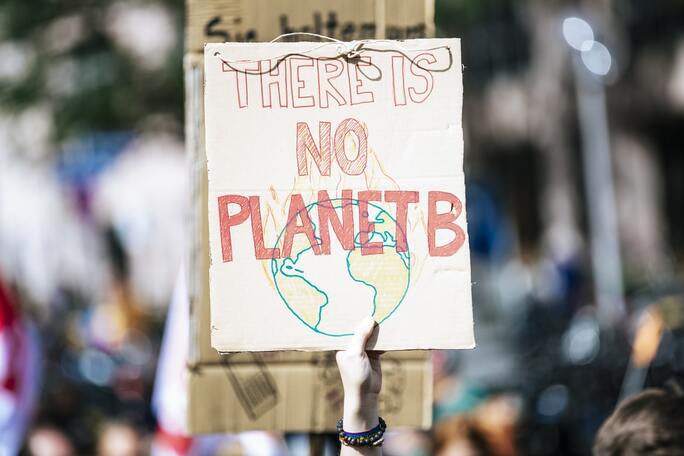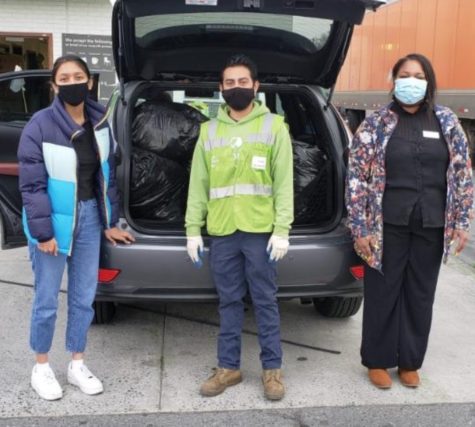International Education Week: The STEM Education Community Club on The Effects of Climate Change on International Communities
Montgomery College’s Office of Student Life hosted its annual International Education Week between November 15th and November 19th. Student Clubs incorporated activities and educational presentations to embrace Montgomery College’s diversity across its campuses embodied by staff and students. The STEMEd club members presented an informative PowerPoint about climate change and its global impact. Amani Mbonimpa, a STEMEd club member, introduced the presentation by defining climate change quoting Rob Dunbar, a Professor of Earth System Science at Standford University and a member of Standford Bio-X, “The long-term change of temperature and typical weather patterns.”
Mbonimpa mentioned that elevated temperatures lead to rising sea levels and extreme weather like floods, wildfires, tsunamis. In addition, severe weather changes negatively impact populations by destroying their homes. As a result, people must be relocated to other areas, displacing them and forcing them to leave their lives behind.
Then, Furaha Mbonimpa, a STEMEd club member, talked about climate change’s extreme evolutions increment in the greenhouse’s emissions in the atmosphere. According to Mbonimpa, regular human activities are the primary cause of global warmings, such as road transportation, oil and gas production, wasting water, and land degradation. Twenty countries are responsible for over 75% of greenhouse gas emissions. These nations cause massive oil production companies leading to drastic climate change. Although people could improve their habits to reduce carbon footprint, such as taking shorter showers and eliminating single plastic usage, it’s crucial to acknowledge the irreversible effects of global warming are influenced mainly by dominant businesses. Mbonimpa also mentions that practical solutions for climate change impact will be found when companies’ regulations shift to eco-friendly procedures to protect the planet.
Everyday routines increase the levels of carbon dioxide and greenhouse gasses emissions in the atmosphere. Mbonimpa showed a pie chart and described the process of CO2 emissions. When sunlight reflects on the planet, greenhouse gas molecules catch the thermal energy that is supposed to go out and “traps the heat in the atmosphere instead of allowing it to go out,” resulting in higher temperatures internationally.
The following presentation slide displayed the global effects of climate change. Furaha Mbonimpa said that although countries like New Zealand are committed to reducing their greenhouse gasses emissions, the ice from their glaciers has melted because of the heat trapped in the planet.
Moreover, greenhouse gas emissions have caused the global temperature to increase by 1 degree Celsius in the past ten years. As a result, the warmest temperature recorded increases every year, resulting in longer daylight hours and hotter temperatures. The exponential growth of global temperatures affects ecosystems and the planet.
Mbonimpa also raises the attention that, climate change not only affects glaciers or unhabituated areas but also alters developing countries like Tanzania, Africa. Unfortunately, since climate change has not been a priority for Tanzania’s government, they have been greatly affected by the weather conditions. The climate crisis has brought periods of relentless rain, sweltering weather, and floods.
Bradley Woodside, a STEMEd club member, explained the rainy seasons “wipe through a lot of the infrastructure built,” which damages crops, affecting the environment. Also, Tanzania has one of the poorest economies in the world, with “67.9% of the country’s population below the poverty line”-Woodside. A nation currently struggling financially faces environmental issues that could result in catastrophic outcomes for its citizens.
In other parts of the world, the results of climate change have disrupted its habitant’ lifestyle. Isabella Gutierrez and Cat Gacek, STEMEd club members, presented the destruction of Puerto Rico’s forests after Hurricane Maria’s impact on the island in September 2017.
The cyclone resulted from warm temperatures that strengthened into a storm due to more superior steam qualities in the atmosphere. As a result, Hurricane Maria’s precipitation levels increased, and when it hit Puerto Rico, Gacek mentions that it destroyed “23% of its total forest biomass”. In addition to land degradation, Puerto Rico saw over 4,000 casualties because of the category five hurricane.
On more details of Maria Hurricane, Eve Elias, a Montgomery College Student, Puerto Rico native, and the Advocate Assistant Editor was interviewed. Eve shares that the entire island lost electricity and water for nearly two months, and many island areas remained without for six to eight months following Maria’s impact. She also mentions that rural towns in high-elevation areas saw extreme flooding, demolishing the only roads that led in and out of the cities, leaving hundreds without food, water, or any means of communication due to the total lack of cellular service. The island, already in billions of dollars of debt, struggled to recover and is still dealing with the negative impacts to their infrastructure and economy today, four years later. Climate change affects the climate and carries severe implications for vulnerable areas and people across the globe.
Global warming has had a more significant impact in areas like Antarctica. Amani Mbonimpa pointed out ice sheets are melting faster as time passes than the world has ever seen. In seven decades, Antarctica has lost “25,000 km of the ice shelf,” as stated by Mbonimpa. Additionally, the wildlife in the continent has been severely impacted and has seen an overall decrease. In particular, penguins, wherein half of the species were extinguished.
Personal opinion and a note from the author:
Although human activities continue to affect climate change, there are still ways to reduce greenhouses emissions. Therefore, it is essential to talk about the importance of global warming and its irreversible damages.
Being proactive about climate change is not only about eliminating single-use plastic or declining straws: another central element of involvement in the climate change cause is voting for representatives who have pledged to find solutions for these issues. Every individual and their actions account for the planet’s future and the next generations to come.




